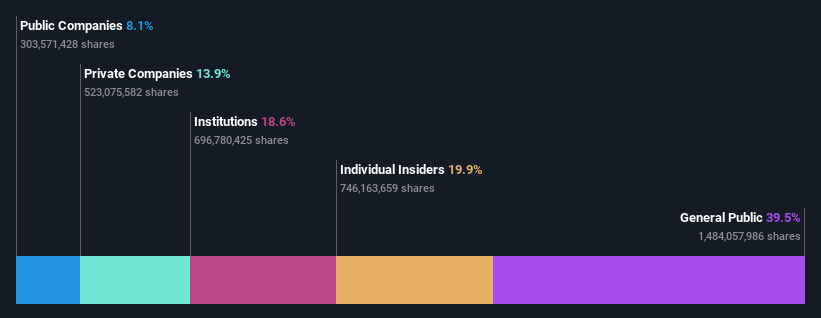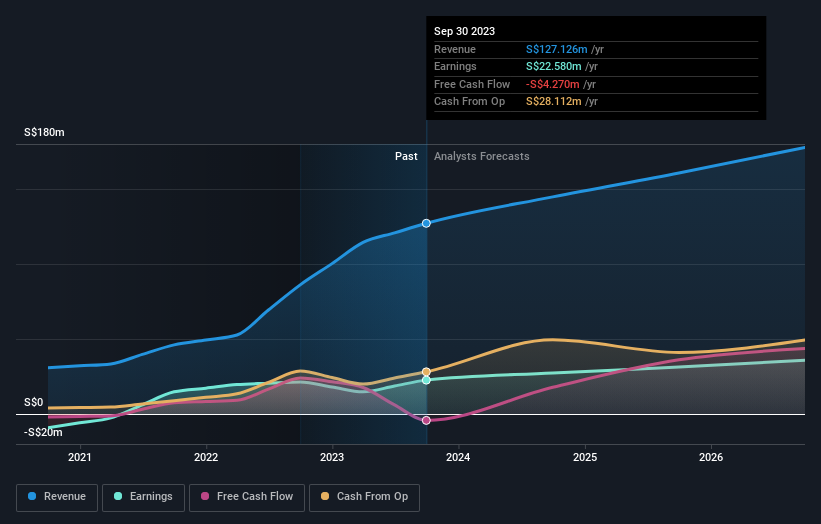- Singapore
- /
- Marine and Shipping
- /
- SGX:5LY
Marco Polo Marine Ltd.'s (SGX:5LY) market cap up S$23m last week, benefiting both retail investors who own 40% as well as insiders

Key Insights
- Marco Polo Marine's significant retail investors ownership suggests that the key decisions are influenced by shareholders from the larger public
- 54% of the business is held by the top 6 shareholders
- Insiders own 20% of Marco Polo Marine
If you want to know who really controls Marco Polo Marine Ltd. (SGX:5LY), then you'll have to look at the makeup of its share registry. We can see that retail investors own the lion's share in the company with 40% ownership. In other words, the group stands to gain the most (or lose the most) from their investment into the company.
Retail investors gained the most after market cap touched S$233m last week, while insiders who own 20% also benefitted.
Let's take a closer look to see what the different types of shareholders can tell us about Marco Polo Marine.
Check out our latest analysis for Marco Polo Marine

What Does The Institutional Ownership Tell Us About Marco Polo Marine?
Institutions typically measure themselves against a benchmark when reporting to their own investors, so they often become more enthusiastic about a stock once it's included in a major index. We would expect most companies to have some institutions on the register, especially if they are growing.
Marco Polo Marine already has institutions on the share registry. Indeed, they own a respectable stake in the company. This can indicate that the company has a certain degree of credibility in the investment community. However, it is best to be wary of relying on the supposed validation that comes with institutional investors. They too, get it wrong sometimes. When multiple institutions own a stock, there's always a risk that they are in a 'crowded trade'. When such a trade goes wrong, multiple parties may compete to sell stock fast. This risk is higher in a company without a history of growth. You can see Marco Polo Marine's historic earnings and revenue below, but keep in mind there's always more to the story.

Marco Polo Marine is not owned by hedge funds. Apricot Capital Pte. Ltd. is currently the company's largest shareholder with 16% of shares outstanding. Nautical International Holdings Ltd. is the second largest shareholder owning 13% of common stock, and Yih Peir Hing holds about 8.1% of the company stock. Yih Peir Hing, who is the third-largest shareholder, also happens to hold the title of Member of the Board of Directors. Additionally, the company's CEO Yun Lee directly holds 4.6% of the total shares outstanding.
We did some more digging and found that 6 of the top shareholders account for roughly 54% of the register, implying that along with larger shareholders, there are a few smaller shareholders, thereby balancing out each others interests somewhat.
While studying institutional ownership for a company can add value to your research, it is also a good practice to research analyst recommendations to get a deeper understand of a stock's expected performance. There are a reasonable number of analysts covering the stock, so it might be useful to find out their aggregate view on the future.
Insider Ownership Of Marco Polo Marine
The definition of company insiders can be subjective and does vary between jurisdictions. Our data reflects individual insiders, capturing board members at the very least. Management ultimately answers to the board. However, it is not uncommon for managers to be executive board members, especially if they are a founder or the CEO.
I generally consider insider ownership to be a good thing. However, on some occasions it makes it more difficult for other shareholders to hold the board accountable for decisions.
Our most recent data indicates that insiders own a reasonable proportion of Marco Polo Marine Ltd.. It has a market capitalization of just S$233m, and insiders have S$46m worth of shares in their own names. It is great to see insiders so invested in the business. It might be worth checking if those insiders have been buying recently.
General Public Ownership
The general public, who are usually individual investors, hold a 40% stake in Marco Polo Marine. While this group can't necessarily call the shots, it can certainly have a real influence on how the company is run.
Private Company Ownership
We can see that Private Companies own 14%, of the shares on issue. It's hard to draw any conclusions from this fact alone, so its worth looking into who owns those private companies. Sometimes insiders or other related parties have an interest in shares in a public company through a separate private company.
Public Company Ownership
It appears to us that public companies own 8.1% of Marco Polo Marine. This may be a strategic interest and the two companies may have related business interests. It could be that they have de-merged. This holding is probably worth investigating further.
Next Steps:
While it is well worth considering the different groups that own a company, there are other factors that are even more important. To that end, you should be aware of the 1 warning sign we've spotted with Marco Polo Marine .
If you would prefer discover what analysts are predicting in terms of future growth, do not miss this free report on analyst forecasts.
NB: Figures in this article are calculated using data from the last twelve months, which refer to the 12-month period ending on the last date of the month the financial statement is dated. This may not be consistent with full year annual report figures.
New: Manage All Your Stock Portfolios in One Place
We've created the ultimate portfolio companion for stock investors, and it's free.
• Connect an unlimited number of Portfolios and see your total in one currency
• Be alerted to new Warning Signs or Risks via email or mobile
• Track the Fair Value of your stocks
Have feedback on this article? Concerned about the content? Get in touch with us directly. Alternatively, email editorial-team (at) simplywallst.com.
This article by Simply Wall St is general in nature. We provide commentary based on historical data and analyst forecasts only using an unbiased methodology and our articles are not intended to be financial advice. It does not constitute a recommendation to buy or sell any stock, and does not take account of your objectives, or your financial situation. We aim to bring you long-term focused analysis driven by fundamental data. Note that our analysis may not factor in the latest price-sensitive company announcements or qualitative material. Simply Wall St has no position in any stocks mentioned.
About SGX:5LY
Marco Polo Marine
Operates as an integrated marine logistic company in Singapore, Indonesia, Taiwan, Thailand, Malaysia, and internationally.
Very undervalued with excellent balance sheet.


